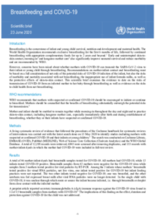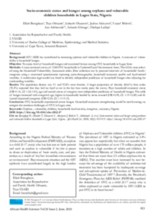Displaying 11 - 20 of 241
Co-sponsored by Bread for the World, The Chicago Council on Global Affairs and 1,000 Days, this webinar heard first-hand accounts from a doctor on the front lines; from a researcher who is a core member of the Standing Together for Nutrition coalition and studying program adaptations in the context of the pandemic; and from a storyteller who shared best practices (and turnkey resources) to bring these stories to life to inspire leaders to act.
In this blog post, the authors call attention to the "malnutrition epidemic" that the world's children are currently facing, exacerbated by the COVID-19 pandemic.
This paper draws upon lessons from SPOON Foundation's work in 17 countries since 2008, summarizing the main nutrition considerations for children in alternative care and offering recommendations on integrating nutrition and feeding practices into alternative care programs. This paper also explores ways that nutrition can support the global movement to ensure every child has family-based care, while meeting the immediate needs of the millions of children currently in all types of alternative care.
The authors of this comment explore their initial analyses and estimates regarding the impacts of the COVID-19 pandemic on children's nutrition and note that these projections emphasise the crucial need for actions to protect child nutrition.
This comment piece from the Lancet describes the impacts of the COVID-19 pandemic on children's nutrition, noting that vulnerable families, particularly in low- and middle-income countries (LMICs) are struggling to access the food and services they need in the context of an economic downturn.
This study examines how food insufficiency relates to HIV infection among caregivers of orphans and vulnerable children (OVC) in Tanzania.
This scientific brief examines the evidence to date on the risks of transmission of COVID-19 from an infected mother to her baby through breastfeeding as well as evidence on the risks to child health from not breastfeeding.
The purpose of this study from the journal of African Health Sciences was to assess the level of household hunger and associated factors among orphans and vulnerable children (OVC) households in Lagos State, Nigeria.
"New data show that an unprecedented number of children in the United States are experiencing food insecurity and did not have sufficient food as of late June," writes Lauren Bauer in this blog post for the Brookings Institution.
This study aimed to explore the experiences and perceptions of health among young people (YP) who have previously lived in care.




